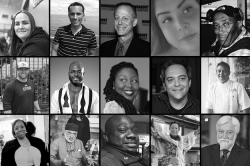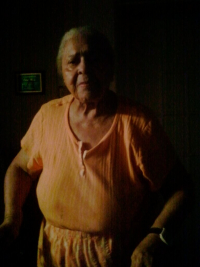This is one in a series of short stories I've been writing during my own coronavirus quarantine. You can find the complete collection of fiction written especially for this blog here. My books are available on the Amazon Kindle, for sale or for reading via Kindle Unlimited.
__________

It wasn’t her looks. It wasn’t her athleticism. It was her grades and her study habits. She was going to spend the next few months choosing among Harvard, Baylor, and Stanford Medical School. Her grades, MCATs and references were immaculate.
Then came COVID-19.
Ann had grown up in what became one of the early hotspots, Albany, GA. Her parents had been at one of the funerals which fueled it. Her mother, Anita, died from it. Her father, Albert, was crippled by it.
Ann went home the moment Tulane closed. She volunteered at a local hospital, the world’s most overqualified candy striper. Soon she was doing a nurse’s duties.
During that whole sad spring and summer, Ann Jefferson nursed strangers all day and her father all night. She lived in a gown, a mask and face shield, without complaint. She washed her hands and face so often her skin blistered.
Albert Jefferson had the full range of post-COVID symptomology. He couldn’t eat. He suffered a stroke. His lungs were permanently scarred. His right foot was amputated. His kidneys were damaged.

Ann figured medical school could wait a year. That fall, during the second wave, the hospital offered her a position, and she took it to stay near Albert.
Time passed. Albert got a little better, then worse. He went into Ann’s hospital. Then he came home again. But he wasn’t the same. He was forced to retire in his early 50s. He spent the days in his wheelchair, on his front lawn. He lay in his bed at night and cried silently to himself. Ann took him to dialysis every week.
Time passed. In his early 60s Albert suffered another series of small strokes. The doctors told Ann he had a pre-Alzheimer’s condition, and suggested a placement at Magnolia Manor, a nursing facility near Americus.
Ann refused. Albert was her life now. Nursing homes were where people went to die in the pandemic. Medical school was long forgotten. She enrolled in a nursing program. She graduated quickly.

Over time she met, nursed, and watched hundreds of good, brave people die. She collected their stories and printed the result on Amazon, with all the money going to a post-COVID charity. The book’s name was “The Scourge,” which is what her survivors called the pandemic.
For everyone at Magnolia Manor time was measured in two ways. There was the time before The Scourge and the time after.
Finally, as Ann knew it would, death took Albert Jefferson at age 73. Ann buried him next to her mother and took stock of her life. Her job paid a good, middle-class wage, which spent well in a town where housing was cheap. But she was an unmarried, middle-aged black woman in southwest Georgia with no prospects. A long dark tunnel lay ahead of her.
Ann didn’t cry. But at night she dreamed.

This Ann Jefferson wasn’t just a nurse-bureaucrat. This was Dr. Ann Jefferson Williams, Harvard Medical Class of 2023. She was director of the Centers for Disease Control. She was the commencement speaker. She told the students to follow their hearts, that their dreams could come true. She told them that the world might hurt them but that they could hit back. Look at me, she said. Follow my example.

Ann sat up, pulled her robe from the bedstead, and pushed her feet into faded slippers. She stood slowly, the pain in her lower back an old friend.
It was January again. It was the year 2065. Ann Jefferson had announced her retirement as director of Magnolia a few weeks before. She would become a patient.
She reached an arm out a few feet to her walker, prepared herself for the day in the small hospital-like bathroom, and she shuffled out of her room. She shuffled down a hall, alone.
At the end of the hall some noise made her look up. The breakfast room was filled with her fellow patients, with staff, and with family members. They all knew her schedule. They knew she was most lucid at this time in the morning, that her pre-Alzheimer’s symptoms would kick in later. But they wanted to let her know that they loved her, that they honored her, that now that it was her turn, she would be taken care of.
Ann raised an arm off her walker, weakly, to acknowledge the cheers. A young man, whom she might have thought quite attractive some decades before, walked up to her with flowers. He looked so much like Albert II he might be his twin. He helped Ann from the walker to a chair and, as he did so, kissed her lightly on the cheek.










